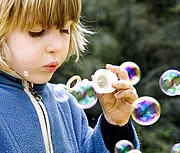 The relation between the global happiness and school-related happiness of 700 12-year-old Finnish students was examined.
The relation between the global happiness and school-related happiness of 700 12-year-old Finnish students was examined.The results showed a strong relationship between happiness and social relationships.
The most popular choices of the happiness increasing factors were:
- success in school
- more free time
- success in a hobby
The least happy students more often than others wanted to have:
- more friends
- better looks
- more money
- a peaceful family life
The results confirm safe social relations as a primary factor underlying children’s happiness.
References:
Global and School-Related Happiness in Finnish Children. JOURNAL OF HAPPINESS STUDIES, 2011.
Comments from Google Plus:
Howard Luks - Our children's lives are far too structured and planned. We have a neighborhood full of young children, yet we are the only ones outside playing. Others are being shuttled to this and that, etc... sad. Let them learn, let them explore, let them socialize and start to cultivate the skills that will last them a lifetime... all IMHO +Wendy Sue Swanson thoughts?
Ves Dimov - Let kids be kids: unstructured play time may be more important than homework
http://casesblog.blogspot.com/2010/03/let-kids-be-kids-unstructured-play-time.html
Howard Luks - Couldn't agree more. Love how you find your links so fast :-)
Ves Dimov - My blog is my searchable archive... And the word "unstructured" rang a bell... :)
Wendy Sue Swanson - I like this thinking. I like the freedom to imagine that children will have space to remain present in their moments, that they'll consider the future without boundaries like they can when roaming in the yard. The structured and planned is becoming a norm---but there is resistance and more and more, parents are thinking about leaving their kids to the space and time they were afforded. With all of the parenting advice that is ever-present, it's hard for some parents to turn it off and tune back into their instincts. When you hear about the necessities of children learning 3 languages before age 7 (because the brain is primed until that age, thereafter it's far more difficult) it's hard not to jump in the car to the language school. This is the curse of more and more research--we get misdirected. We feel we can "perfect parenting." We forget we need time to stare up at the sky...time in the backyard with our hands in the sand and our brother at our side. We need to be able to remember that when life is still and we reflect on what matters, it's unlikely to be the language lesson.


